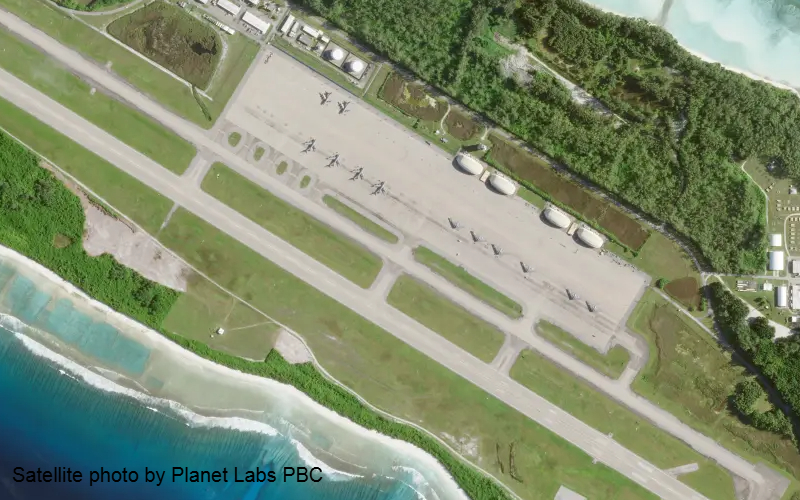The U.S. is days away from a critical third-party moderated meeting with Iran that aims to deter the Islamic Republic from its continued pursuit of nuclear weapons.
As there has been an open display of U.S. military build-up in the region, Ilan Berman told "Washington Watch" Wednesday that Trump, unlike when he imposed sanctions in his first term while pulling out of the 2015 nuclear deal negotiated by former President Barack Obama, has been quick to threaten attacks against Iran.
"If they don't make a deal, there will be bombing," Trump said this week. "It will be bombing the likes of which they have never seen before."
Even in mid-March, as the U.S. resumed action against the Iran-backed Houthis for their attacks on Red Sea shipping, Trump held Iran accountable as the B Team attackers.

"Every shot fired by the Houthis will be looked upon, from this point forward, as being a shot fired from the weapons and leadership of IRAN, and IRAN will be held responsible, and suffer the consequences, and those consequences will be dire!" Trump wrote on Truth Social.
This is a different approach for Trump, Berman told show host Tony Perkins.
Though Trump reinstated his "maximum pressure" and sanctions within days of his inauguration, he quickly showed a willingness to get to the negotiating table to create leverage.
"That's why, when the president sent his letter a couple of weeks ago to the Iranian ayatollahs, he said, 'This is an offer that is not infinite. You have a couple months to hammer out a deal with us, or all bets are off,'" he explained. "Everything that you're seeing now – not only on the diplomatic front, but in terms of military repositioning, in terms of strategic assets being deployed – it's all part of conveying the seriousness of that timetable."
The U.S. has sent two aircraft carriers with B-2 and B-52 bombers, as well as sophisticated air defense systems, to the region. The B-2s carry the Massive Ordnance Penetrator (MOP) bombs, also known as the "bunker busters," which are necessary to reach Iran's deeply buried and fortified nuclear targets. Each B-2 carries two MOPs.
A new "smart fuze" has improved the effectiveness of the MOPs, even when the exact depth and positioning of a buried target is not fully known.
Not just a show of force
Retired Army general and Delta Force commander Jerry Boykin told "Washington Watch" earlier this week that Iran currently has enough weapons-grade enriched uranium to build seven nuclear warheads.
He does not think Trump will hesitate to attack this time.

"This is not just a show of force. I don’t think he wants to turn this into a shooting war, but I think he's ready to do that," Boykin said.
Though presidential advisors are different, Berman believes Trump is being reminded of the ago-old strategy Iran has used when confronted by the U.S. in the past.
"The game plan is to buy time to engage the West in open-ended negotiations under the premise that the West doesn't attack when the West is talking and to use that window of opportunity to build permanence in their nuclear effort," Berman detailed.
Nuclear intentions are something the regime can control, but controlling its people is far more precarious.
"If you look inside the regime itself, it's enormously rickety," Berman noted. "The Iranian economy is spiraling into an ever-deepening domestic crisis. There's a crisis of faith in Iran; something like two-thirds of the country's 75,000 mosques are now shuttered because of lack of attendance, which is a death knell for an ideological religious regime. You have all sorts of signs of societal malaise."
An agreement with the U.S., he said, would help the regime maintain power. It would be the first step in its strategy to remain relevant during Trump's presidency while hoping for a Democratic administration in 2028.
According to Berman, three distinct timetables are in play.
The first is this October, when the Obama nuclear deal – the Joint Comprehensive Plan of Action (JCPOA)– expires. Trump has already issued U.S. sanctions against Iran, but when the deal expires, it would be much harder to gather multilateral sanctions against the regime.
The second is between this summer and next summer "because every intelligence estimate that has leaked into the open source suggests that Iran has between six and 18 months that they need in order to perfect weaponization" of the enriched uranium it currently possesses, the defense consultant relayed.
Political calendars could shape timelines
The third is next fall's political calendar, particularly the midterm elections in the U.S. and the race for prime minister in Israel, where Benjamin Netanyahu's reelection is not certain.
Berman said Netanyahu's government "has staked a tremendous amount of its credibility on eliminating the threat posed by a nuclear Iran. So, there is an expectation that as we get closer to that political deadline of next fall, that the Israelis are going to become more and more activist and may not wait indefinitely."
The weekend talks will be very telling. A bad outcome could prompt the Israelis to attack without U.S. support.
"If the president's Middle East envoy, Steve Witkoff, emerges from this weekend with an Iranian commitment for open-ended talks that are going to take place over weeks and months and will have moving and shifting parameters, that's not a recipe for success, and that's a recipe for potential military action, for example, on the part of Israel," Berman posed.
The JCPOA, signed in 2015 by Iran and several world powers, placed significant restrictions on Iran’s nuclear program in exchange for sanctions relief.
President Trump withdrew the United States from the deal in 2018, claiming it failed to curtail Iran's missile program and regional influence. Iran began ignoring limitations on its nuclear program a year later.
Washington and Tehran have both said they would return to the original deal, but they disagree on the steps to get there.







